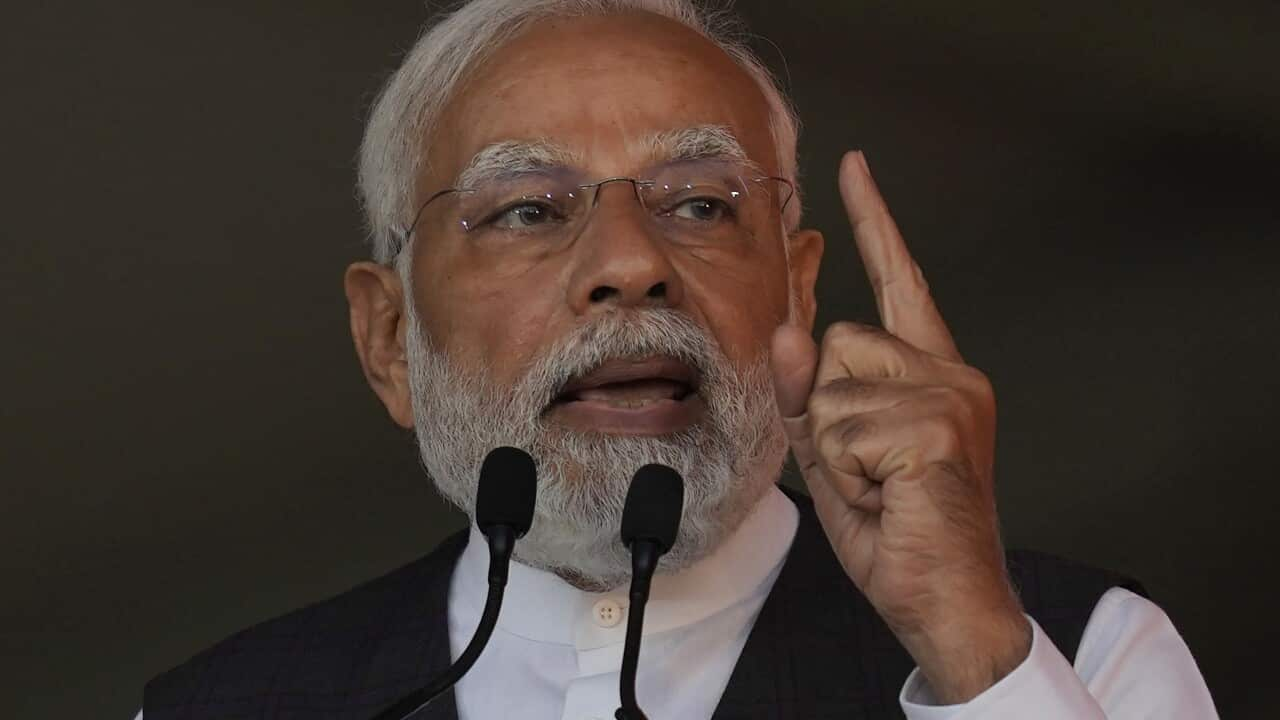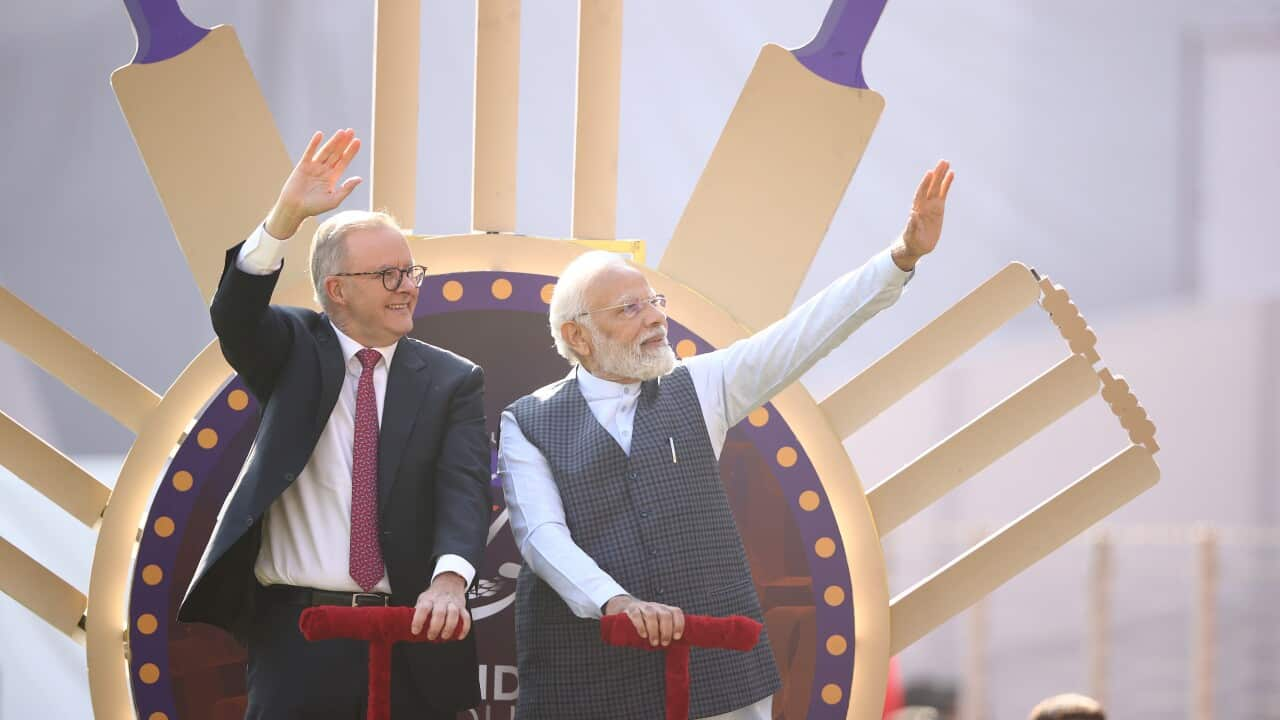KEY POINTS:
- Indian Prime Minister Narendra Modi arrives in Australia this week.
- His trip comes amid increasing tension within Australia's Indian diaspora.
- A Sydney council was forced to scrap an unofficial referendum for Sikh separatists.
A library, a volleyball court, and a paddling pool for children. Fourteen dollars gets you the spa and sauna treatment.
Sydney's Blacktown Leisure Centre is an odd staging ground for sectarian tension.
But this month, Blacktown City Council was forced to looking to hold an unofficial referendum for the creation of an independent ethno-religious state for Sikhs in India, to be named Khalistan.
It came just in time for the arrival of the world's most popular leader, Indian Prime Minister Narendra Modi, who is also accused of running a hardline Hindu nationalist government targeting Muslim and Sikh minorities.

Indian Prime Minister Narendra Modi will meet Anthony Albanese this week. Source: LightRocket / Getty
After being inundated with outraged letters, the posters were torn down and council pulled the plug. A spokesperson warned they could not "practicably mitigate" threats to staff or property.
"Council’s decision is in no way an endorsement of, or criticism of, any political position relating to the internal affairs of India or Pakistan and must not be represented as support for any particular political position," they insisted.
Pro-Khalistan protesters quickly appeared outside the venue, with supporters telling SBS Hindi they intend to vote regardless.
The world's most popular leader

Mr Modi also held a similar rally alongside then-US president Donald Trump in Texas. Source: AFP / Saul Loeb
A Morning Consult poll last month put Mr Modi's popularity at 76 per cent - 15 per cent higher than his second-placed challenger - and his Bharatiya Janata Party (BJP) has wielded a parliamentary majority since 2014.
His 88.7 million-strong Twitter following dwarfs Joe Biden's, with the US President drawing a comparatively meagre 37.2 million.
But major human rights groups also warn the BJP is set on creating a Hindu nationalist state, cracking down on dissent and turning a blind eye to, if not actively supporting, violence against Muslims and Sikhs.
And as ties deepen between India and Australia, members of the diaspora warn the polarisation gripping their homeland is increasingly being exported overseas.
Rockstar welcome
An event at Sydney's Olympic Park this week is expected to draw more than 16,000 fans, with special charter flights - dubbed Modi Airways by organisers - ferrying supporters from cities across Australia.
Mr Modi may also be present if a comes to fruition this week.
Karan Mehta, chairperson for the Indian Students' Association of Victoria, is one of the thousands travelling from Melbourne for the event, and described the chance to "see a glimpse of someone of that stature" as "historic".
Mr Mehta, from Mr Modi's home state of Gujarat, told SBS News his appeal was centred on his revamping of the Indian economy, which he said had put India "on a global map".
"He just wants to attract businesses, he wants to attract culture," he said.
"Spreading the Indian culture offshore, that's never seen or like done before by any of the leadership in India. That also brings a huge impact on a global level."
Mr Mehta hoped free trade talks - with both parties hoping for a deal later this year - will see Australia lift "heartbreaking" limits on arrivals for Indian students from certain regions.
"It's always good to see like a stadium full of people just enjoying the moment. This is a historic moment," he said.

Around 60,000 people turned out to see Mr Modi at London's Wembley Stadium in 2019. Source: Getty / Rob Stothard
'The politics travels'
Mr Modi's rockstar welcomes aren't limited to Australia.
A 2015 visit to the UK saw 60,000 crammed into London's Wembley Stadium, while 50,000 turned out in 2019 to see him appear on stage alongside Donald Trump in Texas.
Teesta Prakash, analyst at the Australian Strategic Policy Institute, said the rallies were central to a "particularly interesting phenomenon": how Mr Modi conducts his foreign policy.
Other leaders were outwardly focused when overseas, but the Indian premier's foreign policy was geared towards his domestic audience, she said.
"What he does here is actually politically-motivated towards how it's perceived back in India," she told SBS News.
“Given the interest in Australia from India ... to have such a big pull here is definitely scoring him some high domestic points.”
Dr Prakash said a large portion of Australia's Indian diaspora had arrived since Mr Modi took office in 2014, and for many he had "really become the face of this new India," which facilitated their success.
“Those connections still are very, very fresh and very strong," she said.
"As migrants become older and more entrenched into the Australian system, they tend to sort of tamper down on that whole connection to the motherland."

Mr Modi and Mr Albanese complete a lap of honour on a chariot in Gujarat this year. Source: Twitter / @narendramodi
"As the diaspora grows in Australia, diversity also grows ... The politics travels with the diaspora. It doesn't just stay back home in the motherland," she said.
International clashes
That dynamic has reared its head overseas.
Tempers flared in New Jersey last year, when a bulldozer - viewed as a symbol of Hindu nationalism - adorned with pictures of Mr Modi was driven around publicly during Indian Independence celebrations.
And simmering tensions boiled over in Leicester last year, in what the BBC described as "large-scale disorder" between young men from the city's Muslim and Hindu populations.
Windows at India's High Commission in London were also smashed during pro-Khalistan protests in March, an incident which saw the UK's ambassador to India summoned to explain what New Delhi called "the complete absence of British security".
In Australia, the Blacktown Leisure Centre incident is only the latest in series of flashpoints.
Plans for a Khalistan independence referendum in January. A handful of Hindu temples in Melbourne and Sydney have also been vandalised with pro-Khalistan and anti-Modi graffiti this year.
Religious leaders and politicians, including , condemned the incidents, while members of Australia's Sikh community feared being swept up in a backlash.
SBS News has also spoken to members of the Indian diaspora who feared a backlash from pro-BJP activists here, or repercussions for family members in India, for criticising the government.

Mr Modi is extremely popular, but critics accuse him of seeking to create a Hindu nationalist state and targeting minorities.
"It gets seeded in Australia and then amplified. What's troubling is we had none of this [before]. Less than 10 years ago, the Indian community was always a cohesive community," he told SBS News.
Mohammed said tensions here rose and fell in line with the situation in India, hitting a high point in 2019 when Mr Modi's government passed citizenship laws criticised by Human Rights Watch for discriminating against Muslims.
The laws prompted months of protests across India, and an outbreak of communal violence in New Delhi killing 53 people - including 40 Muslims - soon followed.
Around that time, Indian Home Affairs Minister Amit Shah described illegal immigrants from Muslim-majority Bangladesh as "termites" and "infiltrators", "one by one and throw them into the Bay of Bengal".
Mohammed said "dehumanising" language used by the BJP had morphed into online abuse of Muslims in Australia, and expected more tension during Mr Modi's visit.
"It'll look [like] hate speech, dehumanisation. It may not be overt violence. But if you leave it long enough, it can become overt violence," he said.
"Modi, and the impact he has had on that social discord, and Islamophobia that the Indian-Muslim diaspora have had to suffer, is decidedly unsettling."
* Not his real name.


